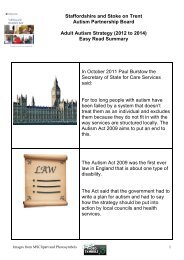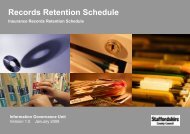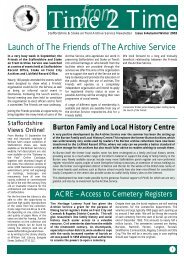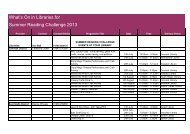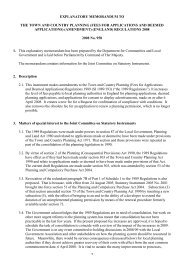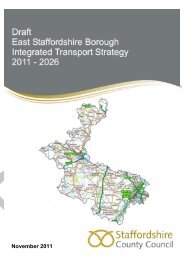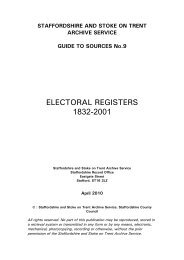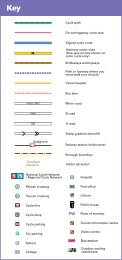nationalCommunitySafetyPlan200811 - Staffordshire County Council
nationalCommunitySafetyPlan200811 - Staffordshire County Council
nationalCommunitySafetyPlan200811 - Staffordshire County Council
You also want an ePaper? Increase the reach of your titles
YUMPU automatically turns print PDFs into web optimized ePapers that Google loves.
22 NATIONAL COMMUNITY SAFETY PLAN 2008–11<br />
■ working closely with partners in health to ensure<br />
that there is suffi cient provision of drug treatment<br />
both for high harm-causing drug-misusing offenders<br />
(including those referred from the CJS) and other<br />
drug misusers. Ensuring that there is early and<br />
appropriate intervention with priority groups such<br />
as prisoners, young people and drug users who are<br />
parents;<br />
■ working with partners to tackle drug misuse as a<br />
driver for offending, building on the success of<br />
offender-based interventions such as DIP and the<br />
PPO Programme;<br />
■ working with partners in health, housing and<br />
education, Jobcentre Plus, the National Offender<br />
Management Service (NOMS) and others (including<br />
in the third sector) to ensure integrated support<br />
to address the range of complex and inter-related<br />
issues faced by drug misusing offenders;<br />
■ tackling the supply of drugs using the National<br />
Intelligence Model, identifying problem areas,<br />
issues and high-harm users, to guide appropriate<br />
intervention.<br />
Detail on specifi c programmes and milestones will be<br />
available in the new Drug Strategy, which is expected<br />
to be published in early 2008.<br />
What does this mean nationally and regionally?<br />
■ Local partnerships can expect the Government to<br />
continue to develop and disseminate good practice<br />
and guidance to support their work.<br />
■ The Government will deliver on the actions and<br />
priorities set out in the national alcohol strategy, Safe.<br />
Sensible. Social. This includes developing guidance<br />
on what is and is not safe and sensible in alcohol<br />
use among young people, supported by a social<br />
marketing campaign. It will also involve working<br />
with industry with a view to considering the need<br />
for regulatory change or legislation in relation to<br />
alcohol, and providing further guidance to ensure<br />
that alcohol enforcement activity is effi cient and<br />
well targeted.<br />
■ The Government (the Department of Health,<br />
DCSF and the Home Offi ce) will run national and<br />
local public health campaigns about the harms<br />
associated with drug misuse.<br />
■ The Government will also work with national and<br />
international partners to tackle the supply of drugs,<br />
disrupt drug traffi ckers and increase the amount of<br />
criminal assets recovered.<br />
■ Government Offi ces have a key role to play in<br />
ensuring that community safety is integral to<br />
strategy, planning and delivery in local areas.<br />
Government Offi ces provide support to and<br />
challenge local areas, disseminate effective practice<br />
and facilitate meaningful collaboration across<br />
partnerships to tackle the full range of crime and<br />
disorder issues.<br />
CASE STUDY<br />
Effective information sharing. Ms B was under a<br />
parole licence that required her to address her drug<br />
problem and comply with a drug testing condition.<br />
However, there were concerns about her progress.<br />
A meeting was arranged for the offender manager,<br />
police offi cer and criminal justice integrated team<br />
(CJIT) caseworker to discuss her case. The CJIT<br />
caseworker confi rmed that Ms B had been missing<br />
appointments; the offender manager reported an<br />
increase in positive drug tests; and the police offi cer<br />
confi rmed that Ms B was seen on several occasions<br />
in the red light area late at night. The welfare of the<br />
three children in her care was of urgent concern.<br />
This was immediately reported to the social services<br />
team that was managing the children’s welfare. As a<br />
result of the sharing of information by all workers<br />
involved, the children’s safety was assured. Ms B<br />
admitted to a relapse and asked for help to restart<br />
her treatment. Within a few weeks, the number<br />
of intelligence reports fell. Ms B attended her<br />
appointments and began giving negative drug tests.<br />
The offender manager gave her a formal written<br />
warning regarding her behaviour, and she remained<br />
under close monitoring by all agencies over the<br />
following months.



